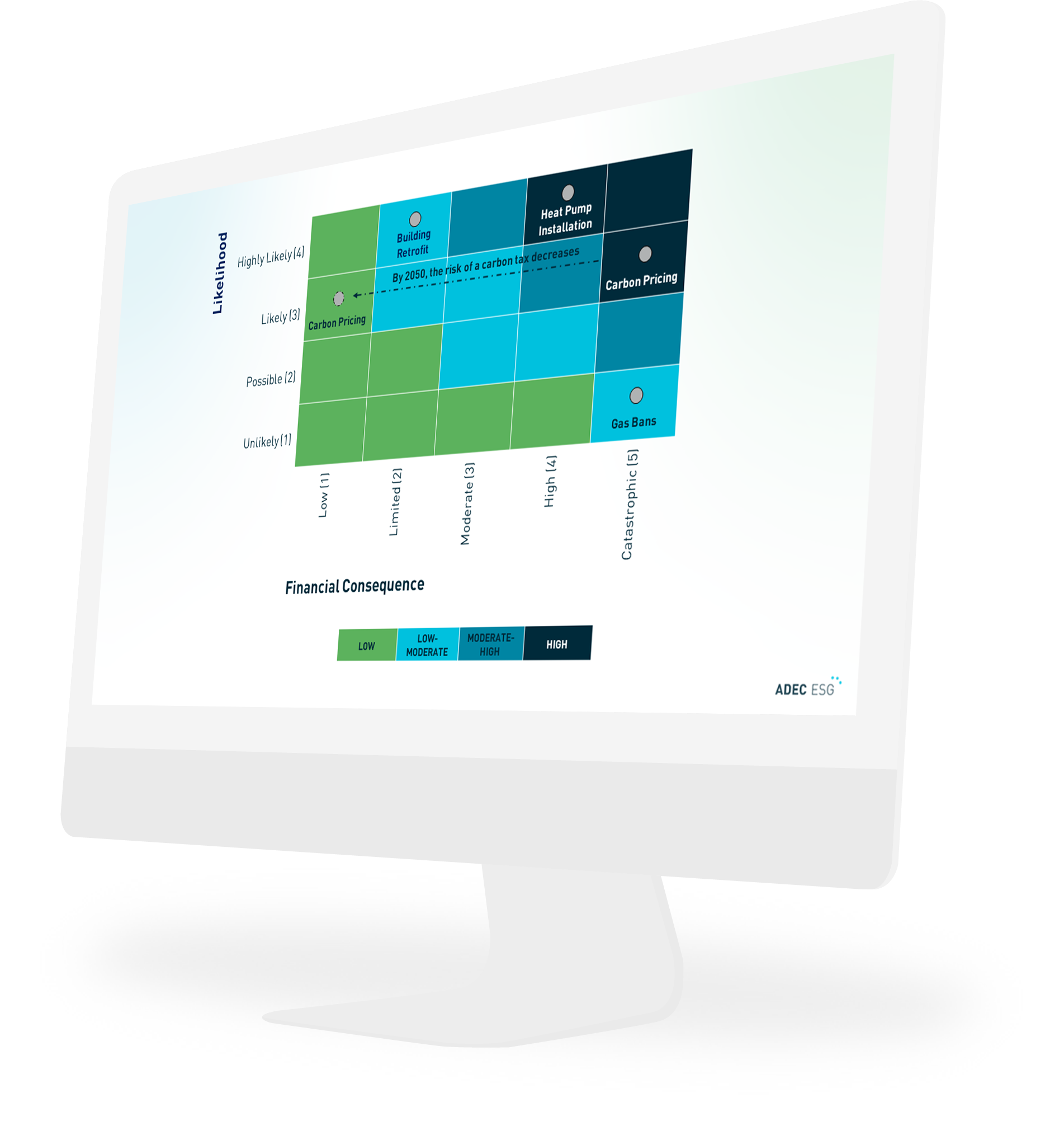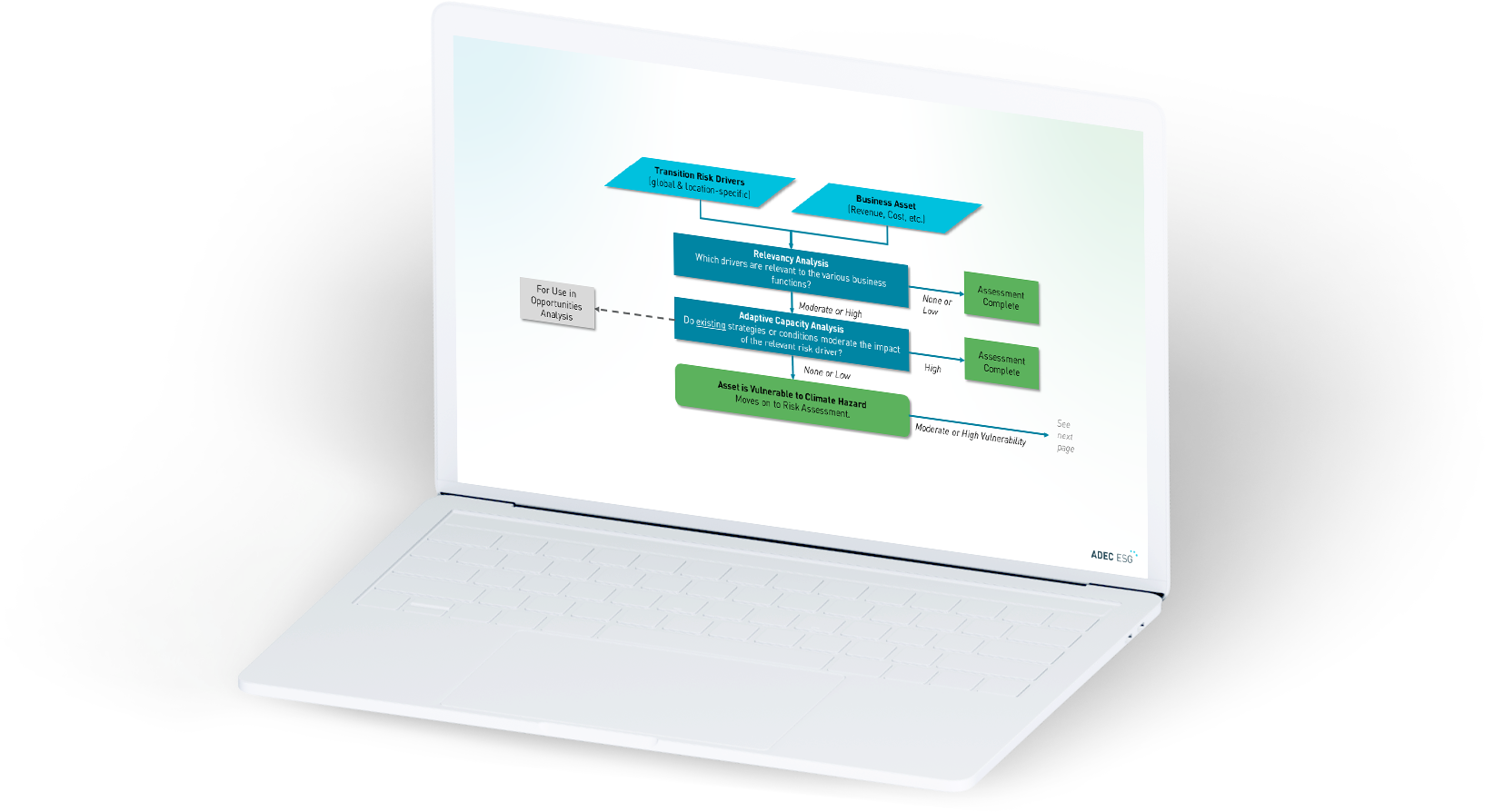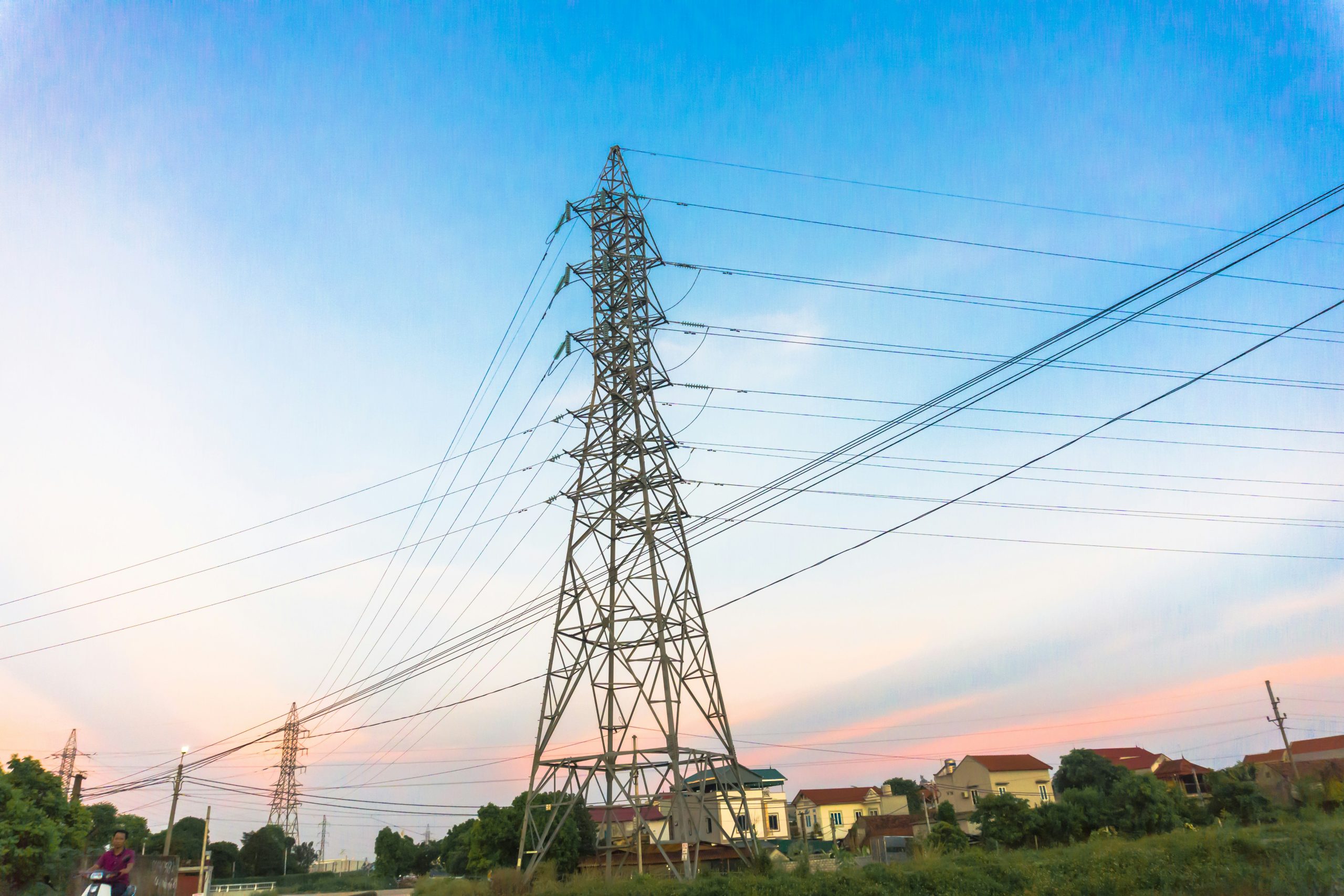Regulations—including California’s Climate-Related Financial Risk Act (SB 261), the EU’s Corporate Sustainability Reporting Directive (CSRD), and the U.S. SEC climate disclosure rule—contain statements that require companies to carry out a scenario analysis to identify current and anticipated climate-related risks and opportunities within their value chains.
The analysis looks at different future conditions (i.e. scenarios) and the potential impacts from physical climate change and low-carbon transitions. The analysis must identify impacts on the company’s operations and its supply chain. It must also describe current risks and opportunities, as well as future anticipated changes in the short-, medium-, and long-term. The identified risks and opportunities are then evaluated against the company’s enterprise risk scale. Significant risks or opportunities need to be integrated into the company’s risk, strategy, finance, and governance functions.


ADEC ESG completed a climate-related scenario analysis for a regulated electric utility located in a hurricane-prone state in the United States. The analysis identified vulnerabilities and risks for the company’s fossil generation plants, planned renewable energy projects, transmission lines and towers, distribution lines and poles, transmission and distribution substations, operations facilities, and customer base. The assets were assessed against changes in average temperatures, heat waves, drought, wildfire, hurricane wind, hurricane flooding, sea level rise, and inland flooding.
The analysis also identified a range of transition risks including regulatory drivers (i.e., carbon pricing/taxes, anti-coal mandates, generation-related water regulations), market drivers (cost of financing, renewable and energy storage prices), technology drivers (i.e., transmission grid upgrades, customer development of behind-the-meter renewable generation), and reputational drivers (i.e., investor sentiments, anti-fossil fuel stakeholder activism).
Although this electric utility is exposed to many potentially costly physical and transition risks, the analysis found that a large amount of the financial impacts could be mitigated by the company’s ability to pass through costs to its customers and therefore few would create significant long-term impacts to the company. Several opportunities were also identified through this work. One example included increased power demand due to electrification and higher cooling energy demand caused by climate change. Other potential opportunities included business model transformations (i.e., carbon capture and storage as a service and renewable gaseous fuel generation, storage, and sales).
Client: Regulated Electric Utility
Location: United States
Project Results and Deliverables:


ADEC ESG completed a screening-level scenario analysis for an international energy distribution company with operations across the U.S. and in many European countries. The analysis focused on natural gas and propane distribution services, including assets such as gas mains, gate stations, storage tanks, terminals, and refineries. While physical assets were identified as vulnerable and had some level of risk to climate hazards, the biggest risk to this company is increasing average temperatures, as a decline in heating degree days over time may permanently reduce demand for natural gas and propane used for commercial and residential customers for space heating.
Transition drivers included carbon pricing mechanisms, restrictions on natural gas use, power sector renewable energy incentives, cost of debt, electrification, and renewable gaseous fuels, among others. Some of the identified transition drivers present potential opportunities. One example is proactive investment in renewable gaseous fuels that can be transported via existing infrastructure. Another potential opportunity is the transformation of the company’s business model to include heat pump installation and related energy efficiency and management services.
Client: Energy Distribution Company
Location: United States and Europe
Project Results and Deliverables:

ADEC ESG has completed a preliminary risk screening for a financial software services company headquartered in California. The analysis focused on five office locations in major North American cities, remote employees in five metropolitan areas, and the firm’s top customer markets in four states. The analysis found that the company has a high level of adaptive capacity within its existing business model. The company’s ‘remote-first’ workforce strategy and use of short-term office leases reduces its vulnerability to long-term physical climate-related risks. Additionally, its data management system, a key asset, is cloud-based and therefore has redundant back-ups and is protected from physical hazards. However, the company was found to be vulnerable to short-term reductions in employee productivity related to hazards such as heat waves, extreme storms, and wildfires and to impacts to its customer market via hurricanes and wildfires. The financial impacts of all vulnerabilities were found to be of low consequence when compared against the firm’s existing risk evaluation system. The analysis provided useful rationale for disclosure statements that described the company’s limited exposure to climate-related risks.
Client: Financial Software Services Company
Location: United States
Project Results and Deliverables:
We’ll set you up with a free consultation with one of our team members, where we’ll discuss your strategic goals—and how we can help you achieve them.
By accomplishing and submitting this form, you authorize us to collect and store your personal information, and to use and process them in connection with your application[s]. You also agree to keep your information updated by re-submitting this form or by emailing us here.
You agree to hold us free and harmless for any damage or injury that may arise from the collection, storage, or processing of your personal information. To know more about our Data Privacy Policy, please visit privacy-statement.
We’ll set you up with a free consultation with one of our team members, where
we’ll discuss your strategic goals—and how we can help you achieve them.